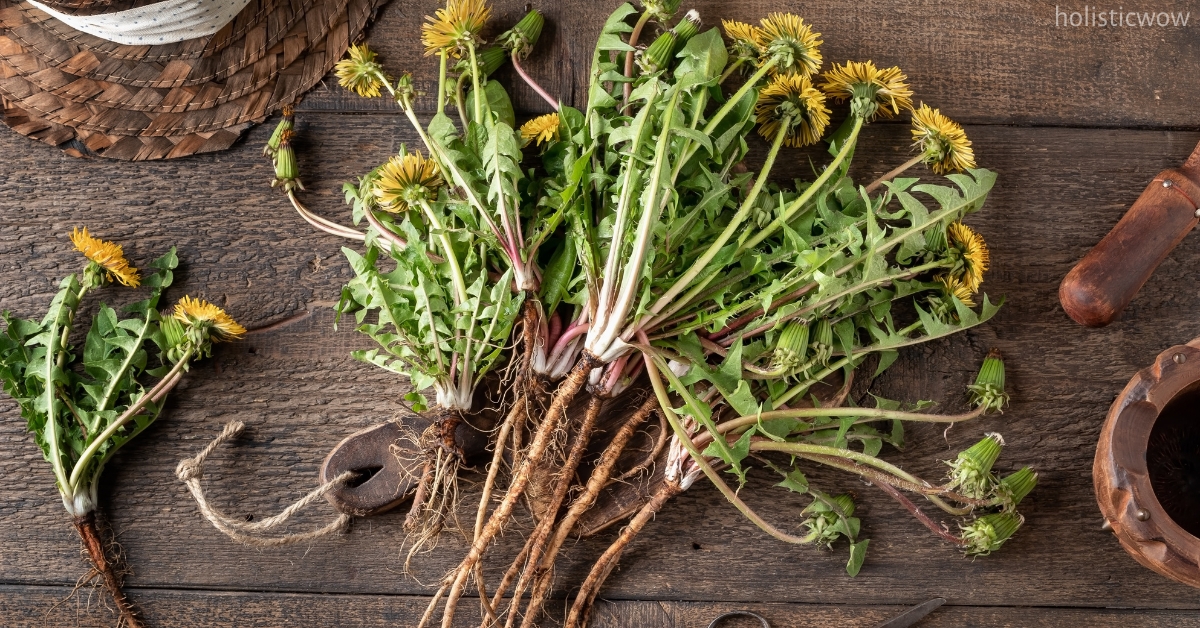What Is Dandelion and How Does It Help with Bloating?
Dandelion is a plant commonly used in traditional medicine, particularly for its leaves and roots.
These parts are often made into tea, a mild natural diuretic that increases urine output.
This process may help reduce temporary water retention and provide some relief from bloating.
Studies suggest that dandelion tea can promote increased urination within a few hours of consumption, which may support the body’s natural fluid balance and help reduce the feeling of fullness and discomfort associated with bloating.
While more research is needed to confirm its full effectiveness, dandelion remains a popular herbal option for mild, temporary bloating relief.
Additionally, dandelion root contains beneficial compounds that could support digestive health, further contributing to its potential role in reducing bloating.
If you’re looking for a gentle, plant-based way to manage occasional bloating, dandelion tea might be worth trying.
Key Takeaways
- 🌼 Natural Diuretic: Dandelion tea acts as a mild diuretic, increasing urine output to help reduce temporary water retention and relieve bloating.
- 🥦 Digestive Health Boost: The compounds in dandelion roots can support digestive health, potentially aiding in nutrient absorption and gut function.
- 💧 Fluid Balance Support: Dandelion contains potassium, which helps maintain electrolyte balance and may prevent mineral loss during increased urination.
- ⚠️ Consult Before Use: While dandelion is generally safe, consult a healthcare professional before use, especially if you have health conditions or are on medication, as it may interact with certain drugs.
Should You Use Dandelion as a Natural Remedy for Bloating?
Due to its mild diuretic effects, dandelion may be a potential herbal remedy for occasional bloating.
Research suggests that dandelion can increase urine production, which could help reduce temporary water retention and provide some relief from bloating.
However, while preliminary studies support its diuretic properties, more research is needed to confirm its effectiveness.
It’s always best to consult a healthcare professional before using dandelion, especially if you have underlying health conditions or take medications, as it may interact with certain drugs.

How Does Dandelion Act as a Diuretic?
Dandelion acts as a mild natural diuretic by increasing urine production, which helps the body eliminate excess fluid.
This process might benefit those experiencing temporary water retention or mild bloating.
Research suggests that dandelion tea or extract may promote diuresis (increased urination), potentially increasing urine output within hours of consumption.
By supporting fluid balance, dandelion might help reduce discomfort associated with mild bloating and temporary water retention.
However, more studies are needed to understand its long-term effects and optimal use fully.
Can Dandelion Help with Water Retention and Swelling?
Dandelion may have a role in reducing mild water retention and swelling due to its mild diuretic properties.
Research suggests that dandelion extract can temporarily increase urine output, which may assist the body in eliminating excess fluids, potentially reducing swelling and discomfort associated wi th temporary flui d retention.
Additionally, dandelion contains potassium, which helps maintain electrolyte balance and could counteract potassium loss that might occur with other diuretics.
Its bioactive compounds also have potential anti-inflam matory properties, which could contribute to temporary relief from swelling linked to fluid retention.
While early studies show some promise, more research is needed to understand its effectiveness fully.
How Can Dandelion Support Fluid Balance in the Body?
Dandelion may help support fluid balance by acting as a mild natural diuretic, meaning it might increase urine production.
This process could assist in managing water retention and reducing occasional bloating.
Some research suggests that dandelion’s potential diuretic effect occurs within hours of consumption, though more studies are needed to confirm its long-term benefits.
Additionally, dandelion contains potassium, an essential mineral that helps maintain electrolyte balance, potentially offsetting some mineral loss that could occur with increased urination.
These combined properties suggest that dandelion may serve as a beneficial herbal approach for managing fluid levels in the body.

What Are the Benefits of Dandelion Tea for Digestive Health?
Dandelion tea may provide digestive health benefits in several ways.
It has traditionally been used to support appetite and may ease mild digestive discomfort, making it a possible option for those experiencing minor gastrointestinal issues.
Traditionally, it has been used to support regular digestion and contribute to overall digestive function.
Dandelion tea may aid digestion by stimulating bile acid production, which plays a key role in breaking down fats and enhancing nutrient absorption.
Dandelion tea might contribute to a healthy gut environment and better digestive health by supporting these processes.
However, while traditional use and early research suggest potential benefits, more clinical studies are needed to understand its effects fully.

How Does Dandelion Improve Gut Health and Nutrient Absorption?
Dandelion may play a role in supporting gut health and nutrient absorption by stimulating bile acid production.
Bile acids play a crucial role in breaking down fats and aiding the absorption of fat-soluble vitamins essential for overall health.
Additionally, dandelion contains prebiotic fiber, which can promote digestive health by encouraging regular bowel movements and supporting a balanced gut microbiome.
By promoting bile acid production and providing fiber, dandelion may contribute to better nutrient absorption and overall digestive health.
These properties make dandelion a potentially beneficial herbal remedy for maintaining gastrointestinal well-being.
What Role Does Dandelion Play in Detoxification?
Dandelion may support detoxification by contributing to liver health and aiding in eliminating waste products.
Its roots contain bioactive compounds that are believed to help stimulate bile flow, which might assist the liver in processing and removing toxins more efficiently.
Additionally, dandelion has demonstrated diuretic properties, which could help support natural detoxification by promoting the elimination of fluids and waste through increased urination.
Dandelion roots contain polysaccharides that have been shown to support liver function and may help protect against certain types of liver damage.
By promoting digestive health and encouraging regular bowel movements, dandelion could help prevent the buildup of waste in the body.
These potential benefits make dandelion a promising herbal option supporting natural detoxification and overall liver health.
Herbal Preparations and Recipes for Bloating
Herbal remedies may help manage bloating by utilizing certain herbs’ potential diuretic and digestive-supporting properties. Dandelion, in particular, has been traditionally used to support fluid balance and digestive health, which may help reduce mild water retention and alleviate discomfort associated with bloating.
The following recipes focus on dandelion and its potential role in digestive health. Always consult a healthcare provider before starting any new herbal regimen, especially if you have existing health conditions or are taking medications.
Dandelion Leaf Tea for Bloating Relief
Ingredients:
- 1 teaspoon dried dandelion leaf
- 1 cup of boiling water
Preparation:
- Place the dried dandelion leaf in a teapot or cup.
- Pour boiling water over the leaf.
- Cover and steep for 10 minutes.
- Strain and drink up to 1-2 cups daily for occasional bloating relief.
This simple tea harnesses the mild diuretic properties of dandelion leaf, which may help support fluid balance and reduce temporary water retention linked to bloating.
Warnings: Dandelion is generally well-tolerated, but it may cause allergic reactions in individuals sensitive to plants in the Asteraceae family (such as ragweed, daisies, and marigolds). Those with kidney disorders, gallbladder issues, or taking diuretics or blood-thinning medications should consult a healthcare provider before use.
Digestive Harmony Herbal Blend
Ingredients:
- 1 teaspoon dried dandelion root
- ½ teaspoon dried peppermint leaf
- ½ teaspoon dried chamomile flower
- ½ teaspoon dried fennel seed
- 1 cup of boiling water
Preparation:
- Combine all the dried herbs in a teapot.
- Add boiling water and steep for 15 minutes.
- Strain and drink up to 1 cup after meals as needed.
This herbal blend combines dandelion’s potential diuretic and digestive-supporting effects with herbs traditionally used for digestive comfort, such as peppermint, chamomile, and fennel. Together, these herbs may support gut function and help ease mild bloating.
Warnings: Peppermint may relax the lower esophageal sphincter, which could worsen acid reflux or cause heartburn in some individuals. Chamomile may cause allergic reactions in individuals allergic to ragweed, daisies, or other Asteraceae plants. Fennel may have mild estrogenic effects and could interact with medications that affect hormone levels or blood clotting. Individuals with hormone-sensitive conditions, acid reflux, or those taking medications should consult a healthcare provider before use.
These herbal preparations can be a complementary approach to managing mild and occasional bloating, but they should not be used as a substitute for conventional medical treatment. Always consult a healthcare provider before starting any new herbal regimen, particularly if you have existing health conditions or are taking medications.

